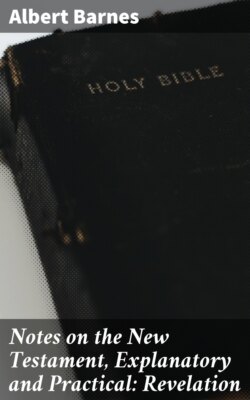Читать книгу Notes on the New Testament, Explanatory and Practical: Revelation - Albert 1798-1870 Barnes - Страница 22
На сайте Литреса книга снята с продажи.
Оглавление27 And137 he shall rule them with a rod of iron; as the vessels of a potter shall they be 138broken to shivers: even as I received of my Father.
27. And he shall rule them with a rod of iron. There is an allusion here to Ps. ii. 9: “Thou shalt break them with a rod of iron; thou shalt dash them in pieces like a potter’s vessel.” There is a slight change in the passage, “he shall rule,” instead of “thou shalt break,” in order to adapt the language to the purpose of the speaker here. The allusion in the Psalm is to the Messiah as reigning triumphant over the nations, or subduing them under him; and the idea here, as in the previous verse, is, that his redeemed people will be associated with him in this dominion. To rule with a sceptre of iron, is not to rule with a harsh and tyrannical sway, but with power that is firm and invincible. It denotes a government of strength, or one that cannot be successfully opposed; one in which the subjects are effectually subdued. ¶ As the vessels of a potter shall they be broken to shivers. The image here is that of the vessel of a potter—a fragile vessel of clay—struck with a rod of iron and broken into fragments. That is, as applied to the nations, there would be no power to oppose his rule; the enemies of his government would be destroyed. Instead of remaining firm and compacted together, they would be broken like the clay vessel of a potter when struck with a rod of iron. The speaker does not intimate when this would be; but all that is said here would be applicable to that time when the Son of God will come to judge the world, and when his saints will be associated with him in his triumphs. As, in respect to all the others of the seven epistles to the churches, the rewards promised refer to heaven, and to the happy state of that blessed world, it would seem also that this should have a similar reference, for there is no reason why “to him that overcame” in Thyatira a temporal reward and triumph should be promised more than in the cases of the others. If so, then this passage should not be adduced as having any reference to an imaginary personal reign of the Saviour and of the saints on the earth. ¶ Even as I received of my Father. As he has appointed me, Ps. ii. 6–9.
28 And I will give him 139the morning star.
28. And I will give him the morning star. The “morning star” is that bright planet—Venus—which at some seasons of the year appears so beautifully in the east, leading on the morning—the harbinger of the day. It is one of the most beautiful objects in nature, and is susceptible of a great variety of uses for illustration. It appears as the darkness passes away; it is an indication that the morning comes; it is intermingled with the first rays of the light of the sun; it seems to be a herald to announce the coming of that glorious luminary; it is a pledge of the faithfulness of God. In which of these senses, if any, it is referred to here, is not stated; nor is it said what is implied by its being given to him that overcomes. It would seem to be used here to denote a bright and brilliant ornament; something with which he who “overcame” would be adorned, resembling the bright star of the morning. It is observable that it is not said that he would make him like the morning star, as in Da. xii. 3; nor that he would be compared with the morning star, like the king of Babylon, Is. xiv. 12; nor that he would resemble a star which Balaam says he saw in the distant future, Nu. xxiv. 17. The idea seems to be, that the Saviour would give him something that would resemble that morning planet in beauty and splendour—perhaps meaning that it would be placed as a gem in his diadem, and would sparkle on his brow—bearing some such relation to him who is called “the Sun of Righteousness,” as the morning star does to the glorious sun on his rising. If so, the meaning would be that he would receive a beautiful ornament, bearing a near relation to the Redeemer himself as a bright sun—a pledge that the darkness was past—but one whose beams would melt away into the superior light of the Redeemer himself, as the beams of the morning star are lost in the superior glory of the sun.
29 He that hath an ear, let him hear what the Spirit saith unto the churches.
29. He that hath an ear, &c. See Notes on ver. 7.
